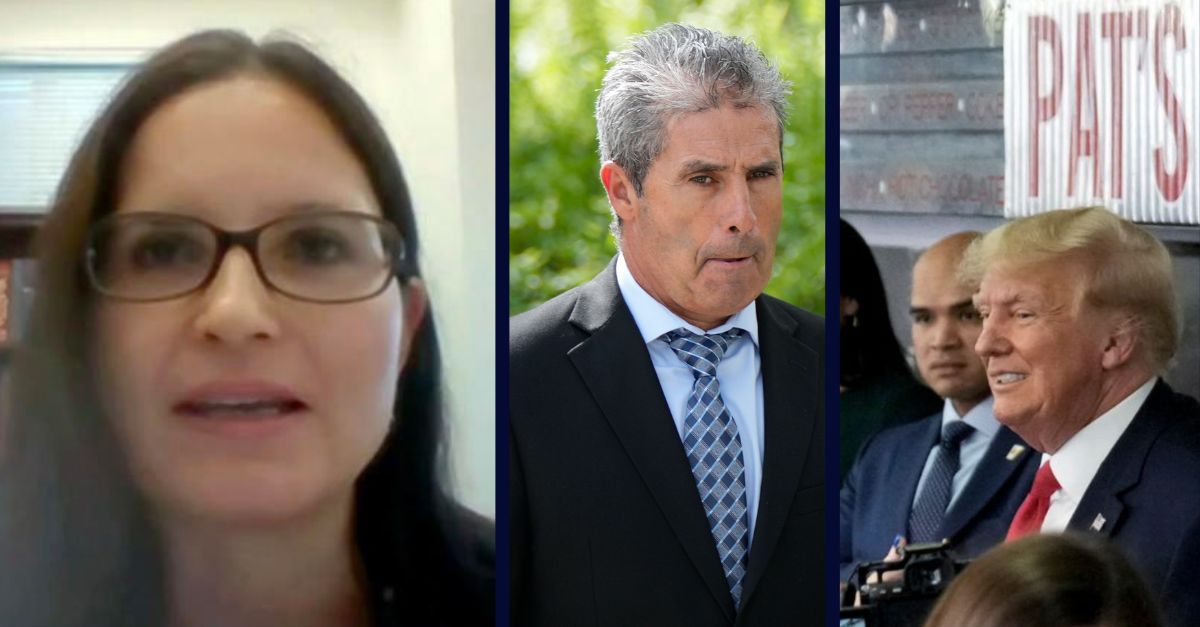

Judge Aileen Cannon (left); Carlos de Oliveira (center); Waltine Nauta and Donald Trump. (U.S. Senate; AP Photo/Rebecca Blackwell; U.S. Department of Justice)
The judge overseeing Donald Trump’s Espionage Act prosecution turned down two attempts to dismiss the case made by the former president’s Mar-a-Lago property manager and valet co-defendants. She disclosed she followed the Jan. 6 obstruction case argued before the Supreme Court and studied conservative judges’ views on the meaning of “corruptly.”
Even though Carlos De Oliveira and Walt Nauta failed in their requests for a detailed account of the charges against them and motions to dismiss the indictment, U.S. District Judge Aileen Cannon spent a lot of time considering Nauta’s challenge of the obstruction charges against him.
The judge’s order rejected Nauta’s claims of unconstitutional vagueness but still found his “multiple-meanings-vagueness” argument “worthy of serious consideration.” She seemed to be leaning towards the defendant’s position that the word “corruptly” in the obstruction statute has multiple and contested judicial interpretations, making it unclear for ordinary people and prone to arbitrary enforcement.
Cannon noted that the U.S. Supreme Court just heard arguments in Fischer v. U.S., a case that could potentially invalidate obstruction charges in many cases due to the interruption of the congressional certification on Jan. 6.
At the beginning of the discussion, Cannon mentioned Justice Antonin Scalia’s agreement in the 1995 case U.S. v. Aguilar.
“Justice Scalia mentioned the ‘longstanding and well-accepted meaning’ of the term ‘corruptly’ in his agreement, endorsing a definition that requires proof of a voluntary and intentional act to achieve an unlawful result or a lawful result through unlawful means, with an expectation of financial gain or other benefit for oneself or another person, these two on the U.S. Court of Appeals for the D.C. Circuit.
First, Cannon mentioned U.S. Circuit Judge Justin Walker, who in U.S. v. Fischer “stated that ‘corruptly’ must require proof of an act ‘with an intent to procure an unlawful benefit either for himself or for some other person.'” protegeNext, she referred to U.S. Circuit Judge Gregory Katsas’ opposition to the D.C. Circuit majority’s broad interpretation of the obstruction law, stating it “creates vagueness problems as well as First Amendment ones.”
“If a ‘corrupt purpose’ may suffice to show acting corruptly, what purposes count as ‘corrupt’?” Katsas asked. “Perhaps ones that are wrongful, immoral, depraved, or evil, but that would just replicate the vagueness and overbreadth concerns noted above.”
Cannon stated that although her references were not completely thorough, Nauta might have a point because of the disagreement among the conservative judges she mentioned and Joseph Fischer’s Supreme Court case.
“The summary above, which is not entirely thorough, supports Nauta’s observation that the term ‘corruptly’ in § 1512 is open to different, somewhat vague interpretations regarding ‘wrongfulness’ and ‘unlawfulness’—resulting in legitimate questions (some might even say confusion) about the term’s definition in the context of obstruction and related crimes,” she wrote. “Additionally, this discussion continues before the Supreme Court this term, as seen in Snyder v. United States, S. Ct. 23-108, and Fischer v. United States, S. Ct. 23-5572.”
Despite acknowledging that Nauta had raised “reasonable questions” about the actual meaning of “corruptly,” Cannon still rejected his dismissal arguments as a failure “under existing law” — “without giving a final opinion on the specific definition to submit to the jury as to the obstruction counts[.]”
Read the order mens rea The Mar-a-Lago judge revealed she’s been monitoring the Jan. 6 case argued at SCOTUS and reading up on conservative judges’ views of what “corruptly” means.
Read the order here.

